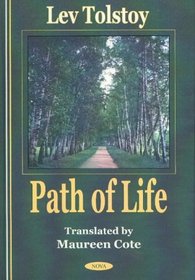Search -
Path of Life
Path of Life
Author:
Path of Life was the last book written by Lev Tolstoy. Although the great nineteenth century Russian novelist is known in English-speaking countries for his major novels War and Peace, Anna Karenina, and Resurrection, he is less known for his numerous religious writings, which present a challenging and original point of view. These works have ... more »
Author:
Path of Life was the last book written by Lev Tolstoy. Although the great nineteenth century Russian novelist is known in English-speaking countries for his major novels War and Peace, Anna Karenina, and Resurrection, he is less known for his numerous religious writings, which present a challenging and original point of view. These works have ... more »
ISBN-13: 9781560728689
ISBN-10: 156072868X
Pages: 330
Rating: ?
ISBN-10: 156072868X
Pages: 330
Rating: ?
0 stars, based on 0 rating
Publisher: Nova Science Publishers
Book Type: Hardcover
Other Versions: Paperback
Members Wishing: 0
Reviews: Amazon | Write a Review
Book Type: Hardcover
Other Versions: Paperback
Members Wishing: 0
Reviews: Amazon | Write a Review




